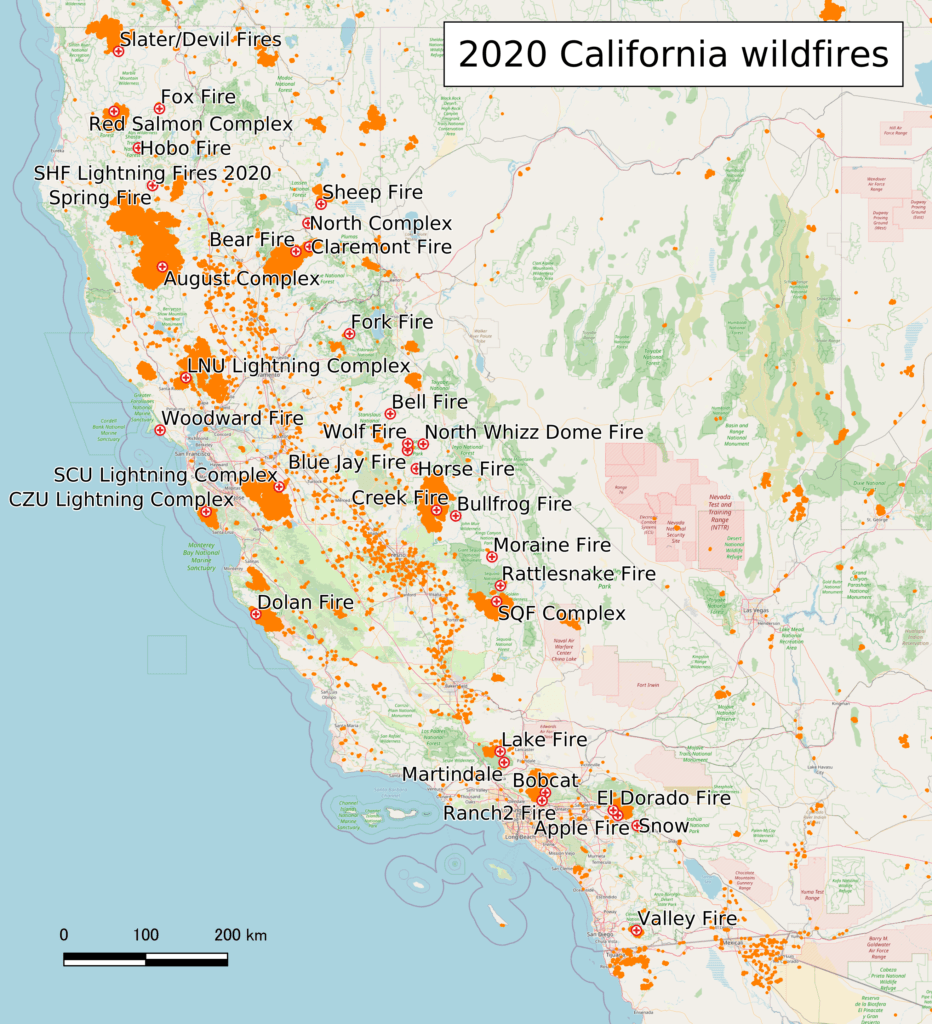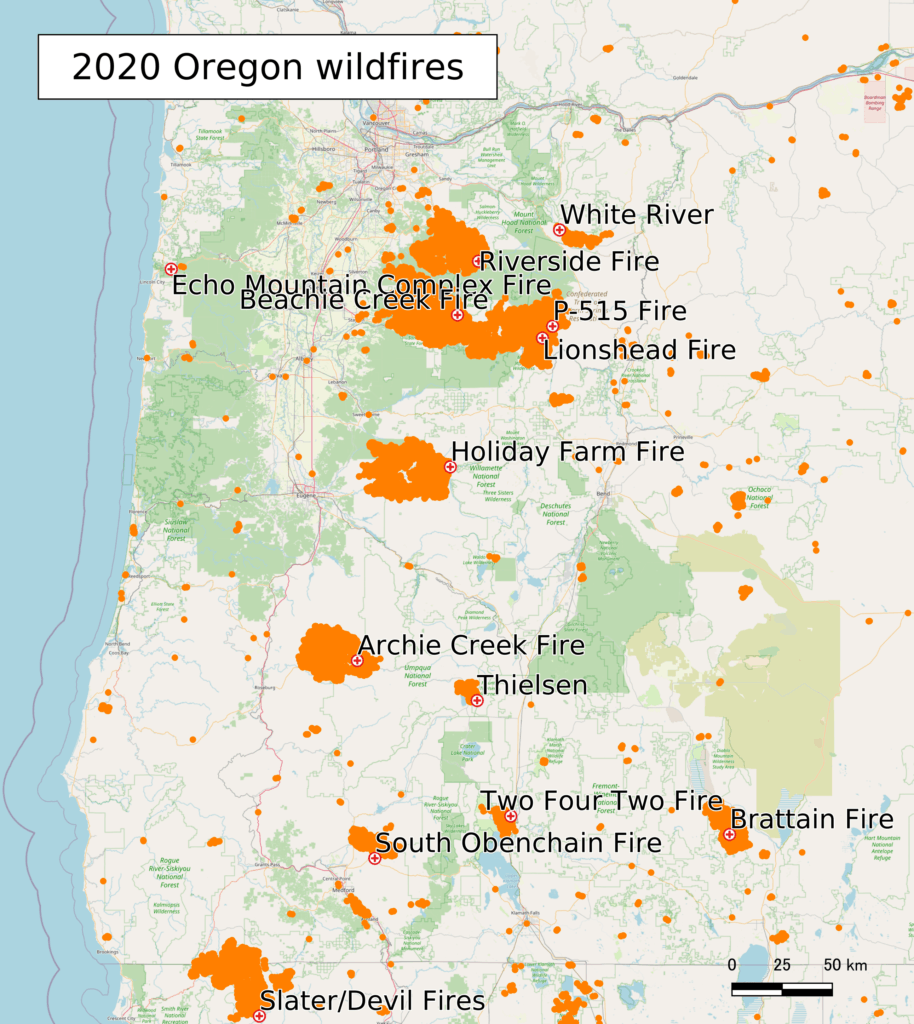This has been the worst fire season in US history. For weeks, the West Coast choked under a blanket of smoke and ash so massive that it spread east across the country and eventually darkened even European skies. But while the air has cleared in many regions, the reckoning has only just begun. In the hard hit cannabis industry, farmers and other operators face unique challenges.
Lance Williams, the president of California’s Lake County Cannabis Alliance (LCCA), offered insight from years of farming in a wildfire danger zone.
“We’ve been evacuated now about three or four times over the years,” he said. “We believe our conditions for growing are better than anywhere in California. We’re up here and have a great tax rate. But we’re surrounded by these fires every year.” Williams and his family lost their cabin in the 2015 Valley Fire. But many farmers have lost more this year. “Two gardens were damaged; One lost around 75% of the weed there. The other lost everything because they would not let the grower go back to water the plants,” Williams explained. “The fires were all around the area and they kept him out for seven days.”

But even after losing so much, he and others in the industry are working toward positive change. This week, the LCCA has an appointment with the fire and police departments to get certifications that will allow farmers to tend to their farms during the wildfires.
“Right now, everyone is just figuring out how to get through these days. The farmers are not going to leave because we love the growing conditions here,” Williams said.
Federal prohibition means that many of the largest insurance providers in the nation refuse to work with the industry. And the few that offer policies are charging irrational rates. The dicey situation compounded because cannabis farms don’t have access to federal subsidies for crop insurance to deflate those excessive costs.
“Most of them [the farmers] are not insured. I found a couple of insurance companies recently, and they will insure up to around $1,000,000. But it’s not cheap – around 10%, or $100,000,” Williams said. “No one in our group has insurance. I think by next year, some definitely might consider it.”
Self-sufficient California farmers are doing everything they can to stay safe. They’re looking at insurance options, purchasing fire trucks, taking classes to get certified as water truck water tenders, and looking into getting bulldozers certified to clear brush.

In Oregon, no one was prepared for this year’s level of devastation. The fires hit hard in the south, especially Jackson County, a legendary stronghold of outdoor farms. In mid-September, strong winds swept the Almeda Fire north across forests and towns, impacting at least 42,000 people.
Federal organizations are working to help people displaced by the wildfires. Last week, FEMA approved Jackson County for direct housing assistance, and the Red Cross has arranged emergency housing for 898 of those displaced by the wildfires. They’ve also provided around 5,400 people with safe refuge from the wildfires in emergency lodgings. But the cannabis industry is left out in the cold.
“FEMA is not going to do anything, and SPA is not going to do anything. We’re not insured, so we’re at a complete and total loss. It’s a tough one,” said Adam Lipsky. The owner of Fancy Pants lost two businesses to the flames; one hemp cigarette manufacturing facility and a recreational THC cannabis facility for distribution. The facilities were next door to each other Lipsky said.
“I was at my shop and left to go to a delivery. I couldn’t make it back because they [the police] closed off the highway,” Lipsky explained. “At this time, the fire was around 20 miles away. My shops were off the interstate and surrounded by homes. I was sure they’d stop it before it reached us.” The inferno continued, resulting in a $400,000 total loss.
But the cannabis community is helping its own. Local farmers have provided Fancy Pants with hemp for free or at discounted prices. Since their packages were lost in the flames, they’ve also been loaned close to $40,000 in manufacturing. Companies have given them products on consignment to fully stock their website, and a grow shop has donated around $1,000 worth of grow inventory.
“We still have people calling every day and asking how they can help,” Lipsky said. “These are the people in the cannabis industry that have been pushed down all their life. The government that I’ve reached out to? They’re the ones that are not helping whatsoever.”
Lipsky is emphatic: “Get insurance. Pay the extra money and get insurance. We never expected a total loss.” Despite having lost so much, Lipsky remains optimistic. “One door burned down, so I’ll build another,” he said.
This isn’t the only instance of the cannabis community shining through the ashes. When the fires hit, the team at Trim Butler had just stocked up for the season with new equipment. All was lost except a few machines they’d brought home for cleaning. They went from an inventory of over 70 machines to half a dozen.
“The entire shop is dust now,” founder Greg Forkash said. “We’re incredibly grateful that it [the fire] stopped before hitting our house!”
Now it’s time to rebuild. And he’s had plenty of help.
“We have been humbled and blessed to have built great relationships with some amazing companies that offered to send us machines on consignment, give us deep discounts, and even gift us machines,” Forkash explained. “BeHemp Equipment, Horizon Harvesting, Tom’s Tumbler, Centurion Pro, Triminator, and TrimWorkz have all had a strong hand in our efforts.” Within 30 days of losing nearly everything, Trim Butler is back up and ready for the harvest season.
Some companies are offering large-scale assistance. Northstar Financial Consulting Group, a CFO, accounting, and tax firm specializing in cannabis, is offering its services pro-bono to assist California, Oregon, and Washington farmers impacted by the wildfires. But with some fires still active, they don’t expect to hear from anyone just yet.
“It’s been really difficult finding the farmers who have been affected,” Lorenzo Nourafchan, CEO of Northstar, explained. “Our hearts go out to those who have been and will be impacted by the wildfires. We want to get the word out that if you’re a grower who has been affected by the wildfires, we’re here to help with insurance claims, calculating losses, and more – for free.”
Even with all this help, some operators will never recover financially from the wildfires. But on the bright side, we’re seeing support and resilience that demonstrates beyond doubt that the greater cannabis community is as robust as its crops.





2 thoughts on “Northwestern devastation mobilizes cannabis industry”
Pingback: New Congressional Bill Could Insure the Cannabis Sector -
Pingback: New Congressional Bill Could Insure the Cannabis Sector - PhuketTimes